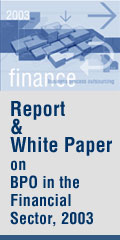|


|
Credit Card issuers need to change current business processes, says TowerGroup
April 21, 2009: The severe contraction that the credit card industry is experiencing after decades of business boom is, according to a new research report by TowerGroup, a direct result of antiquated business models used to measure risk and monitor changing consumer profiles. TowerGroup believes it will take time for the industry to change its business model, but that forward-thinking issuers should begin planning for the post-recession era even as they struggle in a down economy today.
"Although the credit card industry has grown and changed over the decades, its business processes and predictive models failed to evolve with the times, resulting in the ensuing turmoil we see in the industry today," said Brian Riley, research director of bank cards at TowerGroup. "Change of current processes is not a "nice to have" but a "must have" initiative if the industry is to thrive once again."
Although card issuers have standard measurements in place such as industry-wide credit scores, they often neglect to examine the big picture of consumers' creditworthiness realistically. To measure credit portfolios successfully, issuers must take a more holistic view of their customers, looking not only at their credit scores but also their past payment history, credit line management, debt burden, cross-sale potential and the duration of the customer relationship.
After considering these factors, an issuer must utilize a methodology that parses its consumer accounts into retention, modification and exit categories, based on the cardholders' profile results. This dynamic process will allow the issuer to more accurately discern each customer's creditworthiness and determine how broad and deep the financial relationship can and should be.
"Creating a more dynamic control process will prepare forward-looking issuers for a recovering economy and a new order in credit," said Riley. "Although the credit card industry has been rocked by systemic risk, it will emerge as a stronger, smarter industry ready for future changes in the economy, however dramatic."
Additional highlights of the research note include:
TowerGroup finds that revolving debt has finally leveled off in the United States after 40 years of continuous growth.
TowerGroup projects that 2009 will be the first year when total revolving debt decreases. The decrease is due to tighter credit, rising unemployment and a less confident consumer. Although the credit model is under stress, branded card networks continue to flourish with transaction volumes in prepaid and debit; debit and prepaid cards will continue to be the consumer card of choice.
Card issuers will take a hard look at their credit offerings and, until the economy settles, will shift away from riskier segments such as the unbanked consumers with weak credit and those who would have been previously offered starter cards.
US branded total card credit losses to peak at $55.6 bn in 2009...
Click here
(This is press release of TowerGroup)
CLICK FOR SPECIAL SECTION ON GLOBAL FINANCIAL CRISIS
Credit Implications of U.S. Financial Stability Plan and Stimulus Act
Changing trends in credit asset management
Tough year ahead for Asian banks as recession spreads
Greater refinancing risk for Asia-Pacific borrowers
CLICK FOR MORE FEATURES & STORIES

|
|
|



